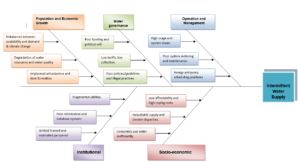Running Out of Water: Cities shifting from 24×7 to intermittent water supply
Do you live in a city where drinking water is available 24×7? Then, you are quite blessed!
In what’s becoming an increasingly common story, many cities today are at risk of running out of water, with water availability now cited as one of the greatest risks to business continuity and growth. Latest cases that made the international headlines are Chennai (India), and Cape Town (South Africa). A severe water shortage is stalking many cities, there are already about 1.2 billion people globally, or almost one-fifth of the world’s population, live in areas of physical scarcity, and 500 million people are approaching this situation.
Around the globe, in many cities, water is not available all day, every day and safe water availability varies widely between and within countries. Those without water have to queue at stand posts—with the additional burden of often not knowing to the nearest day when water may come. Around one billion people receive piped water on premises that is available for fewer than 24 hr every day, in what is called intermittent water supply (IWS).
IWS is a widespread mode of operation for piped systems in both urban and rural contexts around the world. Moreover, according to the United Nations, by 2025, 1.8 billion people will be living in countries with absolute water scarcity and two thirds of the world population could be under deficient water conditions. The culprit is a combination of Global Changes such as climate change, population growth, urbanisation trends and human actions.
It is very clear that the causes of intermittent water supply are different ranging from physical water scarcity to political, social, economic, natural (such as droughts, pollution accidents and earthquakes) and technical factors, which contribute to intensify and increase the water deficit. This situation calls for interdisciplinary approaches to resolving the problems. The below diagram visualizes the potential root causes of IWS.
| Many cities are at risk of running out of water. Every day we delay, we consign ourselves to more difficult and expensive solutions, greater human insecurity. The time for action is NOW for all water stakeholders to face these challenges head-on. |
The need to solve systemic problems of IWS is extremely urgent not only because of the growing complexity of today’s challenges, but also because such problems require new mindsets, approaches, collective actions, large monetary and resource investments with multi-generational consequences. Transitioning toward secure and continuous water supply is the only way that these trends will be reversed and get the sustainable water supply back on track.
According to the Chair of IWA IWS SG, Bambos Charalambous, a paradigm shift is imperative. “Transitioning from intermittent supply to continuous is not an easy task and should be done in a cost-effective manner combining improved operations with targeted capital works. This approach has to be based on sound data, good technical modeling, the introduction of good management practices, particularly related to commercial and technical efficiency and the assessment of different options to find the most cost-effective solution. Furthermore, it is imperative to create a well-functioning water utility that has the capacity, know-how and expertise to operate the system through the introduction of modern management systems, procedures and equipment“.
The numerous problems associated with management and operation of distribution networks under IWS as well as the critical challenges entailed in moving to 24×7 water supply forms the core objectives of the IWA IWS Specialist Group (IWSSG). The work that is undertaken by the IWS Specialist Group will help to better understand what the root causes of intermittent supply are and how to apply, in a simple and practical manner, solutions which will assist water utilities operating their networks under intermittent water supply and to document in a structured manner cases that were successful to move from IWS to continuous supply in a sustainable manner.
The main causes for intermittent water supply
Source: HASSAN ABOELNGA
About IWA Specialist Groups
IWA Specialist Groups cover a wide range of subjects and are one of the main mechanisms for like- minded IWA members to network and share knowledge. They form important engines for scientific and technical content development that drives innovations in the water sector. Spread across IWA’s membership in more than 130 countries, they are an effective means of international networking, sharing information and skills, and making professional and business contacts.


